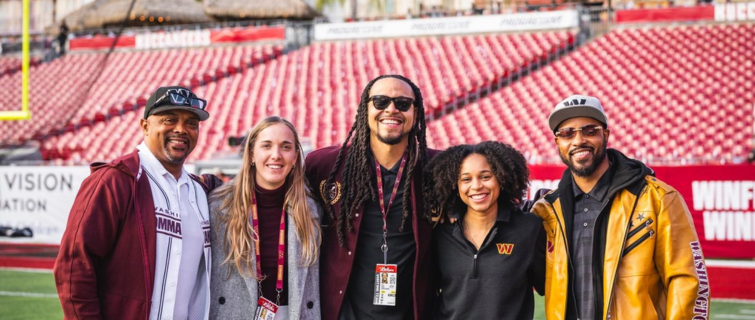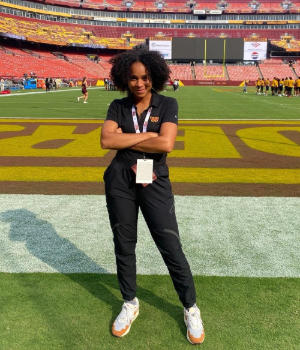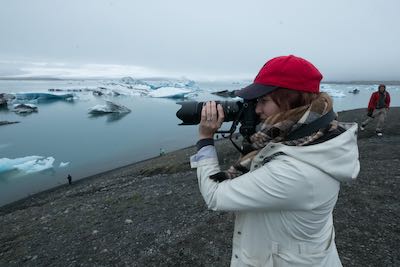
So, what is onboarding like with the Washington Commanders?
You know what onboarding is. That's when you arrive at your new job and are taken around and introduced to your co-workers, maybe given some forms to fill out, perhaps told something about the history of the organization, its values, and, if it has one, a mission statement. A film might be included. Maybe somebody will take you to lunch.
These are, arguably, best practices for onboarding. And then there is what Kayla Key experienced on her first day as a digital video producer for the Commanders.
It was a little different.
“It was incredibly overwhelming, everything happening at once,” recalls Key, a graduate of the Master’s in Journalism program at Georgetown University. She remembers hearing something like: “Welcome to Day One. Here’s the bathroom. Here’s the cafeteria. We’re going to start filming in about an hour.”
It was August at training camp in Ashburn, Virginia. And while Key would later come to realize that the Commanders—and new owner Josh Harris—had created the kind of inclusive, positive culture that the team and its fans hadn’t seen in years, there was no time to talk about that. It was just four days before the first preseason game, and they had work to do.
“So, we went live from training camp,” Key recalls.
A Fun and Demanding Job
In her job with the Commanders, Key works on a busy seven-member team of producers and editors that handle nine different series over the course of a season. She especially likes “The Player’s Club,” which is hosted by former players and offers the kind of expert analysis that only football veterans can provide—plus a healthy dose of humor.

“We’re talking about football, but we’re also talking about all the different things that led them here, what’s going on in their lives outside of football,” Key says of the Emmy-nominated show. “It’s such a fun show, and it’s also one of my favorite shows to produce.”
How does Key handle the often hectic pace and the need to be ready at any time, despite how she might be feeling? She explains by referring back to her time in high school in Pennsylvania, where she was a standout runner and her father was the coach of a track club. He noticed that his daughter was not only a good runner but an excellent all-around athlete, so he encouraged her to try the heptathlon, a two-day competition consisting of seven events, everything from hurdles and high jump to shot put and javelin throw.
“You know, they give out scholarships for college for these things if you really want to do it,” he told her.
So, she took him up on it, later excelling at the sport and receiving a full athletic scholarship to Hampton University, where she became an accomplished scholar-athlete.
And this is where she learned how to be calm under pressure—the heptathlon is not a one-race-and-you’re-done kind of thing; you have to keep your composure all day.
“I only had 30 minutes to cry about it if I didn’t do well in the long jump or the shot put,” Key says. “I only had 30 minutes to put that out of my head, and then I had to focus on the very next event.
“And it’s the same thing when I’m shooting a show and I take the wrong camera. I’m like, ‘Okay, I have to move on. The show has to continue.’ That’s just sort of what it’s been my entire life.”
A Film Honoring Trailblazers
Perseverance was also the subject of a feature-length documentary Key filmed in 2022 that has won numerous awards, including Best Sports Documentary Feature Film at the Seattle Film Festival and Best Biographical Film at the New York International Film Awards. Directed by Anthony “Tony” Reed, “Breaking Three Hours: Trailblazing African American Women Marathoners” looks at what was once a tiny subset of marathon runners.
There were few Black people running marathons when they competed, decades ago; even fewer Black women; and even fewer Black women who broke the coveted “three-hour” threshold that separates the great from the very good. Reed and Key talked to nine of these women, and the quiet determination they project is remarkable.
Before accepting her job with the Commanders in 2023, Key was a digital video producer at TEGNA, a broadcasting arm of Gannett. There, she edited made-for-platform videos and helped TEGNA share the best content with local stations—everything from heartwarming videos to explainer pieces about current events. She also covered both the summer and winter Olympic Games in 2022.
Before all of that, Key was a studio technician at C-SPAN, a job she took while a student in the Master’s in Journalism program. She says the program prepared her well for the news show, her work in network television, and her job with the Commanders.
For Key, journalism has always been about storytelling, and she has a lot of stories left to tell.
“There are many more stories than you can ever get to, so many stories because every player has a story to tell,” she says of her job with the Commanders. “And we solely cover this team. We do not cover any other teams. We might talk about another team as far as a matchup, but we’re solely following this team, this franchise, and it’s awesome.”
